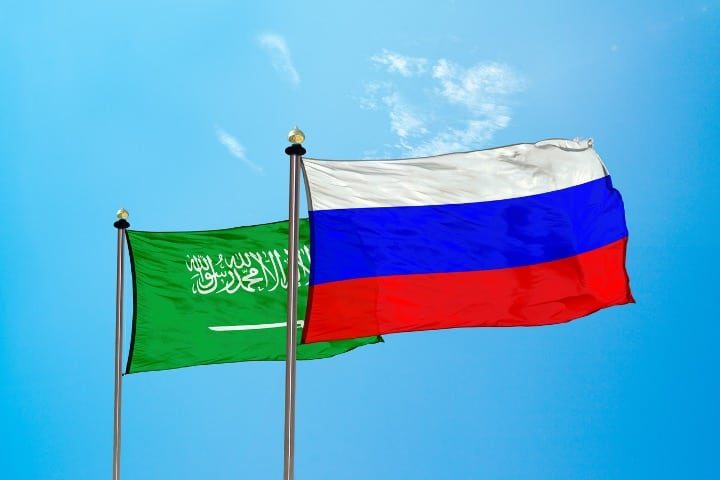
SINGAPORE — On April 21, Russian President Vladimir Putin and Saudi Crown Prince Mohammed bin Salman spoke to one another over the phone, the Kremlin press service announced. The leaders discussed matters ranging from collaboration in the oil market to solutions for “regional crises” in the Middle East.
“The parties discussed several key topics on the bilateral agenda, with an emphasis on further expanding mutually beneficial ties in trade, economic cooperation, investment and energy,” the Kremlin declared.
The Russian government also revealed that both sides “expressed satisfaction with the level of coordination at OPEC+ aimed at ensuring global oil market stability,” and that the “prospects for cooperation between Saudi Arabia and the BRICS were also considered.”
Set up by the Organization of the Petroleum Exporting Countries (OPEC) in 2016, the OPEC+ alliance is a group of countries spearheaded by Saudi Arabia and a group of other major oil producers led by Russia.
Previously this year, some of the leading OPEC+ producers divulged voluntary cuts in oil production of 1.16 million barrels per day (bpd) from May until the end of 2023. These cuts were in addition to a curb of 500,000 bpd on Russian output and a two-million-bpd cut in the production targets that have been underway since last November.
In the face of criticism, OPEC+ justified the cuts, saying they are necessary to shield oil markets from volatility, and the Saudi Ministry of Energy portrayed them as a “precautionary measure aimed at supporting the stability of the oil market.”
Moscow explained that they are necessary in a period of high fluctuation due to the present banking crisis in the United States and Europe, general global economic uncertainty, and unpredictable and short-sighted energy policy choices. Before the cuts were announced, oil prices had fallen to a 15-month low, but the OPEC+ reductions propelled them higher.
On the other hand, the International Energy Agency (IEA) claimed that the OPEC+ decision would worsen an oil-supply deficit and undermine the global economic recovery instead of helping markets. “Our oil market balances were already set to tighten in the second half of 2023, with the potential for a substantial supply deficit to emerge. The latest cuts risk exacerbating those strains, pushing both crude and product prices higher,” the IEA said in its latest Oil Market Report.
Besides discussing oil-related matters, Putin and bin Salman talked about peacemaking attempts in the Middle East, the Kremlin press service elaborated without providing more details. “The two leaders exchanged views on various aspects of the developments in the Middle East in the context of the efforts Russia and Saudi Arabia are participating in to resolve regional crises.”
There have been hints in recent weeks that due to current diplomatic attempts of various parties, the conflicts in Yemen and in Syria could end.
Previously this month, Syrian Foreign Minister Faisal Mekdad made a landmark visit to Saudi Arabia, the first such trip since Riyadh severed diplomatic ties with Damascus in 2012. After Mekdad’s visit, Saudi Arabia publicly advocated for Syrian unity and integrity, championing a political solution to the 12-year-long conflict.
Also, China brokered a peace deal between Saudi Arabia and Iran to reboot relations, with historic peace talks to end the eight-year-long conflict in Yemen, which has been boosted by a long-standing competition between Tehran and Riyadh.
Russia Moving Up in Global Economy
These moves depict the increasing isolation of the United States and its allies, as more countries move away from the dollar for fear that the U.S. will weaponize the greenback against their trade and economic interests should they deviate from U.S. globalist values.
Kirill Strelnikov of Russia’s RIA Novosti wrote in an op-ed on April 22 that although Western nations thought they could ruin Russia’s economy, they were wrong.
According to Strelnikov, Western “experts” in 2007 issued a report alleging that the total contribution of the BRICS countries to the global economy would pale in comparison to that of the G-7 until 2032.
However, he said, those projections were wrong, as the BRICS countries caught up with the G-7 in terms of their role in world economic growth as early as 2020. He also stated that Western analysts, as sycophants of the globalist Deep State, made a similar mistaken evaluation of Russia’s economic prospects following the onset of the Ukraine conflict in February 2022.
Strelnikov cited an article by the U.S.-based international affairs publication The National Interest, which concluded that prior Western comparisons of the Russian and Italian economies reflected their evident incompetence, as these pundits relied on nominal GDP figures to compare both economies.
The National Interest’s authors posited that such a methodology was rudimentarily flawed, as neither the exchange rate nor purchasing power parity (PPP) considered factors such as per capita wealth, living standards, labor productivity, or the availability of key material resources and goods, instead of “paper” assets like copyrights and global brands. The authors concluded that Russia’s real GDP could be compared to that of Germany, at $4.81 trillion for Russia versus $4.85 trillion for Germany in 2021.
Further boosting Russia’s position in the global economy has been the country’s major role in providing energy, important natural resources, and food to other countries, thus ensuring global security, a significance that has been ignored or glossed over by Western pundits.
In contrast to Russia’s reported economic resilience and natural resource availability, said Chris Watling, chief executive of financial advisory firm Longview Economics, in a recent interview with CNBC, the United States is on the verge of recession, according to its “brutally bad” economic data. One of the factors indicating an impending recession is the Leading Economic Index for the U.S., which fell by 1.2 percent in March, its lowest level since November 2020.
Watling claimed that the typical timeline for a recession is about a year after the Treasury yield curve reverses, and as the curve first inverted in March 2022, the economic downturn is likely to be looming, he said. “Every time you’ve had that in the U.S., you’ve had a recession. So, I think it’s coming, it’s on its way. It’s just a timing issue.”
Seymour Hersh Blasts NYT
Further suggesting that Western media outlets have been skewed in their analyses and reporting, U.S. investigative journalist Seymour Hersh, known for his reporting on American complicity in the Nord Stream pipeline explosion as well as the corruption of Ukrainian government officials, lampooned The New York Times (NYT) over its pro-government position and evaluation of sources, and how it enabled the FBI to locate and arrest suspected whistleblower Jack Teixeira after the infamous Pentagon document leaks.
The NYT and The Washington Post, together with Western-funded “open-source investigations” entity Bellingcat, traced the source of the leaked documents to Teixeira and publicly revealed his identity. Going a step further, the NYT even identified Teixeira’s home in Massachusetts and interviewed his mother.
According to RT, in an interview with Afshin Rattansi on Going Underground, Hersh said, “Don’t get me going on the press; the press is a no-win situation for me.” He added that he had worked at the NYT for many years and “won a lot of prizes,” when the paper was much better at shielding its sources. “One of the most important stories I wrote [in 1974] about the CIA spying on American citizens had nobody named in it,” he said.
He added that the Times has revealed itself to be totally“pro-Biden,” as it does not critique the controversially installed U.S. president at all, and furthermore, just like other mainstream media outlets, it failed to report on his article accusing the Biden government of American complicity in the Nord Stream pipeline explosions in the Baltic Sea last September. They only published “counter stories given by the intelligence community,” Hersh claimed.
Some pundits and U.S. government sources have disputed mainstream media claims that Teixeira supposedly posted classified U.S. intelligence data on the Ukraine conflict in an online gaming forum. Insisting that it “does not make sense” that Teixeira could get hold of documents such as the CIA Operations Center Intelligence Report, these skeptics posited the possibility that Teixeira was being “scapegoated.”



